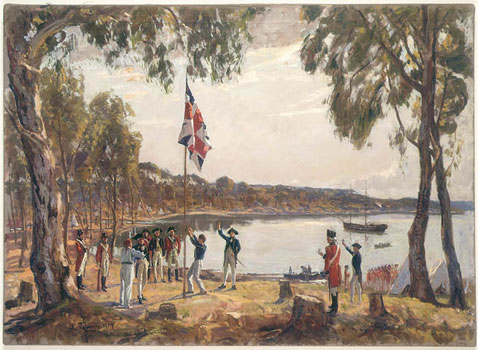The animals were taken on board two by two. Sound familiar?
This is not only a story of what happened on Noah’s Ark, this is what happened as Captain Arthur Phillip prepared to bring the First Fleet to Australia.
Each of the eleven vessels was like a mini-Noah’s Ark. In this and many other ways, Phillip and his associates were preparing for a trip that would take over 1000 passengers on a 252-day voyage, travelling 25,750 kilometres, to create the first British settlement in Australia. The voyage was one of the most successful in modern maritime history.
Charles Middleton, under the instructions of the English Prime Minister, William Pitt, was tasked with finding eleven suitable ships and equipping them for the long voyage. Pitt considered Middleton the ‘best man for the job’. He was a trusted professional within the Public Service and was known to be honest, ethical, and strongly opposed to all forms of corruption. A strong Christian faith underpinned Middleton’s good character. His motto was ‘Without religion there can be no public principle’.
Middleton chose Captain Arthur Phillip to lead this new enterprise very carefully. Phillip laid a fair and humane foundation for the colony at a time when many nations – including his own country – were still actively engaged in the slave trade. Phillip declared: ‘There can be no slavery in a free land, and consequently no slaves.’ His anti-slavery principles really were uncommon at the time. The Abolition of the Slave Trade Act would not be signed for another nineteen years.
Contractor, William Richards Junior was one of the main people responsible for organising the transport of convicts on the First Fleet. He, too, was a Christian and had a reputation for being honourable in business. The success of the voyage itself was remarkable. During the journey, only 48 lives were lost. Incredibly, all the ships arrived safely within two days of each other.
By contrast, the Second and Third Fleets that later came to Australia were contracted to a company which was engaged in the slave trade. This greatly affected their care for the human lives on board. Five times more deaths occurred (267 of the 1006 convicts) on the Second Fleet, and the death rate on the Third Fleet was twice that of the First Fleet.
Once he’d arrived in the New South Wales colony, Arthur Phillip also showed humanity towards Indigenous people and concern for good relations with them. Phillip’s response to one difficult and violent incident demonstrates his general care for the Indigenous people he encountered. During a visit to Manly, an Indigenous warrior speared him in the leg. Instead of reacting in violence or revenge, Phillip commanded his men that there was to be no pay-back.
The Christian faith had significant influence for the early colony in many ways. The Reverend Richard Johnson was appointed Chaplain to convicts going to Botany Bay. Before leaving Britain to begin the journey to Australia, Johnson was introduced to the Board of the Society for Promoting Christian Knowledge, who gave a important gift to the colony: a collection of books. This first library of the new colony was transported on the HMS Sirius, the flagship of the First Fleet, and the people who gave this gift prayed that God would bless Johnson in his work. They asked him to write to them and let them know how things were going. (This organisation is still operating in Australia and around the world today.)
The library consisted of 500 Bibles, 100 Common Prayer Books, 400 Testaments and over 3,600 additional pieces of Christian literature. The Society supported Richard Johnson’s vision of establishing a strong Christian influence in the early settlement of this new colony.
Arthur Phillip and the other leaders associated with the foundation of the new colony of New South Wales had an important quality in common: their desire to serve God and their fellow humans honourably and their trust in God to help them with the enormous responsibilities they undertook.
Written by Graham McDonald (adapted from an article by Stuart Piggin, used by permission).
Source material:
Dr Stuart Piggin, ‘The First Fleet: Maritime Triumph and a Triumph of Humanity’ (Dr Piggin is Associate Professor and Director, Centre for the History of Christian Thought and Experience, Macquarie University, NSW, Australia).

